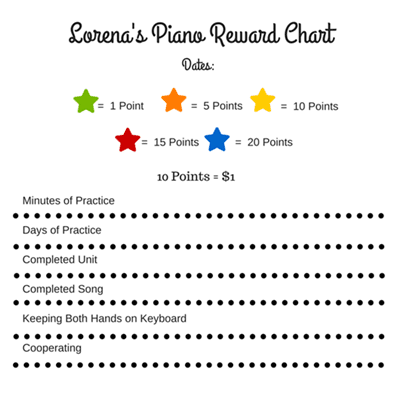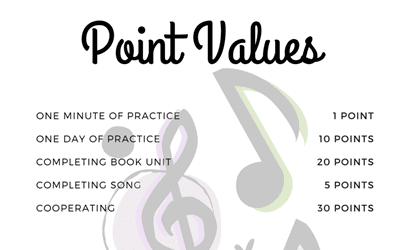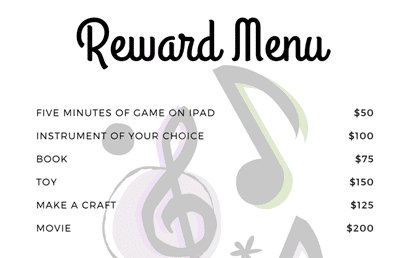Getting your child to practice anything can be tough! It’s easy for them to get distracted, bored, or otherwise uninterested when faced with a task. In this article, piano and singing teacher Mariana L. shares her reward system for kids that works brilliantly on her music students…
Children can get bored and easily distracted while trying to focus on a task.
Many of them look like this:
As a piano and voice teacher, the number one question I receive from parents is:
“How do I get my child to practice more?”
This question usually arises after they find themselves constantly nagging their children to practice. In turn, this causes the music students to become frustrated; they may even lose the interest and love they felt for their instrument when they began taking lessons.
What’s my suggestion for handling this situation? A reward system. Its purpose is to encourage students to practice and regain the joy they felt for music when they first wanted lessons.
In my experience, parents are always excited about introducing a reward system for music lessons because it’s something familiar; most of them already use a reward system at home for their children’s schoolwork, chores, behavior, etc.
It can be tough to get kids to practice their instruments, but a reward system can help motivate them! Here are some tips for setting up a system that will motivate your child to put in the extra effort. With a little creativity, you can come up with a system that works for your family and helps your child master their instrument.
Why Do We Have a Reward System for Kids?
Reward systems rely on positive reinforcement in order to inspire good behavior (like practicing!). Some tips for setting up a reward system for kids include:
- Make sure the system is age-appropriate
- Reward immediately after the desired behavior
- Track only one behavior at a time (start by rewarding the practice routine before moving to other elements to avoid confusion)
- Provide plenty of praise
- Keep it simple and use simple wording
- Don’t bribe
Reward systems can deal with points, tickets, tokens, or other incentives to encourage them to engage in certain behaviors, like music lessons. In this post, I’ll tell you about the reward system for kids that I use daily -and give you a few other ideas you can try.
If you haven’t signed your child up for music lessons yet, what are you waiting for? You can do so here. You can get an idea of what your child might learn in a music lesson by watching the video below:
(273) TakeLessons | Kids Rock with Music Lessons – YouTube
What is a Reward System?
The concept of a reward system stems from the operant conditioning studies of psychologist B.F. Skinner. Skinner studied positive and negative reinforcement as a way of changing or achieving a behavior from an individual.
In his laboratory, Skinner placed some rats in a box that had a lever, which, upon pulling it, released pellets of food. At first, the rats would accidentally push the lever and receive their reward. After several times of getting food by accident, they figured out how to receive the reward (food) whenever they wanted it.
For children, practicing their instrument is the lever and the food is whatever your child gets excited about. Their reward could be toys, books, games, or even an extra outing to the park – it’s up to you.
Setting Up a Reward System
I strongly recommend you work with your child’s instructor to figure out what both of you would like to achieve from the reward system. For example, you might simply want your child to practice more than fifteen minutes a day, but your child’s instructor might also want them to mark their sheet music before coming to the lesson.
Work out your goals first, then compare them to the goals of the instructor, and then construct the reward system from there.
To prepare your little music student for success, make sure they have the following items:
- An assignment chart
- Tons of stickers
- Fake money [optional]
With my students, I use three sheets to manage the system.
1) The Point Tracker
On this sheet, each colored star has its own point value. All you need to do is assign X amount of points to X amount of dollars and you’re good to go! I find it easiest to calculate points per one dollar value.
2) The Point Earning Guide
On this sheet, you’ll assign a point value to behaviors and/or tasks. You can be as broad or as specific as you want. For instance, you could reward ten points per one minute of practicing, or fifteen points for finishing a unit. In this example, the guide is quite specific because there were certain behaviors my student’s mother and I wanted to correct.
Are reward point systems good for kids? Absolutely. A point reward system for kids can encourage them to change their behavior and fast. Some critics argue that point reward systems weaken the relationship you have with a child. However, that’s only true if there are no other incentives involved in trying to get your child to practice.
As long as you make sure your lessons are engaging and enjoyable, the child will continue practicing to get points – and over time, you may be able to rely less on the points and more on intrinsic motivation to get the child to practice.
3) The Reward Menu
This part of the process, in my opinion, is the most fun to create! Parents, teachers, and students can work together to decide what type of prizes the student will receive. My rewards include students getting to play with a box of my percussion instruments, playing a musical game on my iPad, or playing on my keyboard with voices other than the piano (violin, trumpet, xylophone, etc.).
Remember to assign a somewhat high “cash” value to the rewards to ensure the goal is not achieved too early. As a bonus, this is also a wonderful way to teach children about saving money!
My Shareable Files
I use a free graphic design service called Canva to create sheets for my students. Below are the sheets that I use. Feel free to change them based on your student’s needs and desires.
How to Keep the System Working
After working with a reward system for a few months, parents often wonder if the system is sustainable. In other words, they’ll ask:
“Will I always have to reward my child in order to get them to practice?”
To tell you with complete honestly, there’s no general answer to that question. Some students develop an almost Pavlovian response to practice, where they no longer need a reward to pick up their instrument every day; playing music IS the reward.
The natural consequence of more practice is, of course, developing an advanced skill to play an instrument. And with enough practice, being able to play more complex and interesting pieces of music.
If a student is not ready to practice without getting rewarded, it’s always a good idea to find ways to keep the system fun and fresh; every couple of months, sit down to change the rewards and ways to earn points. It’s best to consult with the student’s teacher first, since certain behaviors and skills might have already been achieved.
Other Reward System for Kids Ideas
The system I’ve told you about above works really well at keeping kids motivated. However, it’s far from your only option! Here are some other ideas for a reward system for kids.
Online Reward System for Kids
Some virtual reward systems for kids to try include:
- Virtual Rewards Tags from Performing in Education
- Digital Stickers
- ClassDojo Points
- Virtual Field Trips
- Sending them their favorite eBooks
- Giving them time to play their favorite online video games
Even something as simple as giving your child extra time on their favorite electronic devices is a good way to encourage good behavior!
Ticket Reward System for Kids
A ticket reward system is something else you can try to encourage good behavior.
In this, you’ll award a certain number of tickets for a desired behavior. For example, your child might get two tickets for practicing for half an hour, four tickets for a full hour, and so on.
The key here is not just to award the tickets, but to make sure there is a tangible reward attached to the tickets. Your child needs to know that they’ll get something in exchange for collecting all those tickets or they won’t work as hard to get them!
Reward System for Kids App
You can also use an app to reward your child’s good behavior. Some great apps to consider include:
Many of these are meant to be used for rewarding kids for chores, but you could easily use them for other things (like practicing their instruments), too.
What Are Good Kids Rewards?
When you are trying to come up with a good reward system for kids, you need to think carefully about the individual child to find the right type of reward.
Some good rewards include:
- A treasure chest filled with cheap toys or candy from the dollar store
- Special activities (like a trip to the park)
- A later bedtime (check with Mom and Dad on this one!)
- Extra electronics time (again, check with the parents)
- Crafts
- Coupons
- Social activities
- Food
- Tokens or stickers
Take the time to brainstorm rewards with the child you’re working with to come up with an idea of what they’d like the most in exchange for learning an instrument.
And don’t forget! Although it’s not necessarily a tangible prize, praise is one of the best ways to incentivize your child to practice. When they know you are paying attention to their effort, they’ll be motivated to keep up the good work in their music lessons.
Do Reward Systems Work for Kids?
If you’re looking for a way to get your kids excited about practicing their instruments, using a reward system may be the answer. There are many different systems that you can try, so pick the one that will work best for your family and start seeing results!
Reward systems work for kids of all ages. As long as you can find the right type of reward for your child, you’re sure to see results – and convince your child to sit down and practice!
Conclusion
If you can take anything from this post, it’s this: remember the joy that music brings to your child’s life. Find a way to keep that passionate flame burning. The last thing they want is to restart piano lessons as an adult, regretting the fact that they quit as a child.
For more information about reward systems and encouraging your child to practice, try scheduling a lesson with a private music instructor. A little one-on-one instruction goes a long way!
Know any tricks to get young students to focus on practice? Comment below!
 Post Author: Mariana L.
Post Author: Mariana L.Mariana L. teaches singing, piano, and Spanish in Maple Grove, MN. She’s holds a Masters of Music degree from The Catholic University of America. Her approach to teaching is speaking in terms that are easy for her students to understand and remember. Learn more about Mariana here!
Mac








